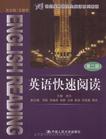英语快速阅读(第二册)
出版时间:2009-4 出版社:中国人民大学出版社 作者:洪云 页数:173
前言
根据1993年国家教委颁布的《非英语专业研究生英语(第一外语)教学大纲》,硕士生外语教学的目的是培养学生具有较熟练的阅读能力,一定的写、译能力和基本的听、说能力,能够以外语为工具进行本专业的学习和研究。可以看出,研究生英语教学仍把阅读教学放在各项技能的首位。此外大纲还具体规定了研究生在经过基础阶段的学习之后,在阅读能力方面须达到的要求:掌握并能运用各项阅读技能(如概括中心思想、猜同悟意、预见、推理和推论等),具有语篇水平的分析能力。能较顺利地阅读并正确理解有相当难度的一般性题材文章和其他读物,速度达到每分钟60词~70词,读后能够理解中心思想及内容。计时阅读难度略低、生词不超过总词数2%的材料,速度达到每分钟100词~120词,读后能理解中心思想及主要内容。由此可见,深化阅读教学,进一步提高阅读能力,仍是培养和提高研究生语言运用能力的关键所在。 本套教材是以《非英语专业研究生英语(第一外语)教学大纲》为指南,在参考国内外多种英语快速阅读教材的基础上,根据编者多年从事研究生英语快速阅读教学的经验,以及我国非英语专业研究生目前整体英语水平和实际英语能力,经过编委会认真、广泛的讨论之后编写而成的。 《英语快速阅读》分第一、二两册,供非英语专业硕士或博士研究生一学年使用,与中国人民大学出版社出版的《新编研究生英语系列教程》(第二版)、《研究生英语系列教材》(第三版)和《研究生英语综合教程》配合使用。本套教材旨在帮助读者扩大英语词汇量,提高阅读速度和阅读理解能力,广泛深入地了解世界各国,尤其是欧美国家的历史文化、风土人情以及自然科学和人文科学等方面的知识。 本套教材编写严谨。第一册遵循理论与实践相结合的原则,讲练结合,分为两大部分:(1)快速阅读概述及应试技巧;(2)快速阅读练习,共32篇短文。第二册共精选短文48篇,内容涉及中西文化、教育、生活、媒介、历史、科技、哲学、文学等,按阅读量与难度的递增分为3个部分,每部分包括16篇文章。两册书选材的原则突出体现科学性、信息性、可读性和趣味性,内容丰富、有趣、时尚,旨在帮助学生进行系统的、有针对性的快速阅渎训练,掌握基本阅读技能,培养良好阅读习惯,提高阅读效率。练习形式多样,既有选择填空的客观题型,又有简短回答、填空、对错判断等主观题型;既注重寻读、略读、猜词悟意、写摘要等快速阅读基本技能的训练,又与各级考试的阅读题型相结合;每册书后附有本册书练习的参考答案供师生参考。使用本套教材非常有利于学生通过各种水平的英语考试。 书中部分文章的版权分别属于不同的个人或机构,请各版权持有者通过出版社与本书编者联系处理。 南于编者水平有限,书中错误疏漏之处在所难免,敬请广大读者和同行专家批评指正。 编者 2009年2月
内容概要
《英语快速阅读》分第一、二两册,供非英语专业硕士或博士研究生一学年使用,与中国人民大学出版社出版的《新编研究生英语系列教程》(第二版)、 《研究生英语系列教材》(第三版)和《研究生英语综合教程》配合使用。本套教材旨在帮助读者扩大英语词汇量,提高阅读速度和阅读理解能力,广泛深入地了解世界各国,尤其是欧美国家的历史文化、风土人情以及自然科学和人文科学等方面的知识,培养读者的世界眼光和跨文化意识。 两册书选材的原则突出体现科学性、信息性、可读性和趣味性,内容丰富、有趣。时尚。练习形式多样,既有选择填空的客观题型,又有简短回答、填空,对错判断等主观题型;既注重寻读、略读。猜词悟意。写摘要等快速阅读基本技能的训练,又与各级考试的阅读题型接轨。使用本套教材十分有利于学生通过各种水平的英语考试。
书籍目录
Part Ⅰ Passage 1 Passage 2 Passage 3 Passage 4 Passage 5 Passage 6 Passage 7 Passage 8 Passage 9 Passage 10 Passage 11 Passage 12 Passage 13 Passage 14 Passage 15 Passage 16Part Ⅱ Passage 1 Passage 2 Passage 3 Passage 4 Passage 5 Passage 6 Passage 7 Passage 8 Passage 9 Passage 10 Passage 11 Passage 12 Passage 13 Passage 14 Passage 15 Passage 16Part Ⅲ Passage 1 Passage 2 Passage 3 Passage 4 Passage 5 Passage 6 Passage 7 passage 8 Passage 9 Passage 10 Passage 11 passage 12 Passage 13 passage 14 Passage 15 Passage 16
章节摘录
For most of US,work is the central,dominating fact of life.We spend more thanhalf our conscious hours at work,preparing for work,traveling to and from work.Whatwe do there largely determines our standard of living and to a considerable extent thestatus we are accorded by our fellow citizens as well.It is sometimes said that becauseleisure has become more important the indignities and injustices of work can bepushed into a corner;that because most work is pretty intolerable,the people who doit should compensate for its boredoms,frustrations and humiliations by concentratingtheir hopes on the other parts of their lives.I reject that as a counsel of despair.For theforeseeable future the material and psychological rewards which work can provide,andthe conditions in which work is done,will continue to play a vital part in determiningthe satisfaction that Iife can offer.Yet only a small minority can control the pace at whichthey work or the conditions in which their work is done;only for a small minority doeswork offer scope for creativity,imagination,or initiative. Inequality at work and in work is still one of the cruelest and most glaring formsof inequality in our society.We cannot hope to solve the more obvious problems ofindustrial life,many of which arise directly or indirectly from the frustrations created byinequality at work,unless we tackle it head-on.Still less can we hope to create a decentand humane society. The most glaring inequality is that between managers and the rest.For mostmanagers,work is an opportunity and a challenge.Their jobs engage their interestand allow them to develop their abilities.They are constantly learning;they are ableto exercise responsibility;they have a considerable degree of control over their own-and others-working lives.Most important of all,they have the opportunity to initiate.By contrast,for most manual workers,and for a growing number of white collarworkers,work is a boring,monotonous,even painful experience.They spend all theirworking lives in conditions which would be regarded as intolerable-for themselves-by those who take the decisions which let such conditions continue.The majority have little control over their work;it provides them with no opportunity for personaldevelopment.Often production is SO designed that workers are simply part of the.technology.In offices,many jobs are SO routine that workers justifiably feel themselvesto be mere cogs in the bureaucratic machine.As a direct consequence of their work experience,many workers feel~ilienated from their work and their firm,whether it is in public or in private ownership. Rising educational standards feed rising expectations,yet the amount of controlwhich the worker has over his own work situation does not rise accordingly.In many cases his control has been reduced.Symptoms of protest increase-rising sickness and absenteeism,high turnover of employees,restrictions on output,and strikes,both unofficial and official.There is not much escape out and up-wards.As management becomes more professional-in itself a good thing-the opportunity for promotionfrom the shop floor becomes less.The only escape is to another equal frustrating manual job;the only compensation is found not in the job but outside it,if there is a rising standard of living.
图书封面
评论、评分、阅读与下载
